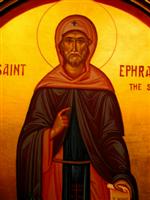 In his collection of Hymns On Paradise, St. Ephrem the Syrian, who lived during the fourth century, uses theological poetry to reveal the indescribable beauty of Paradise and explain our relationship to it. It’s a great example of how Orthodox Christian theology, rooted in the East, remains unconfined by rigid Western academic explanations and philosophical descriptions. Instead, Orthodox Christian theology is regarded as a mystery, encountered through personal experience, and expressed through stories and poetry.
In his collection of Hymns On Paradise, St. Ephrem the Syrian, who lived during the fourth century, uses theological poetry to reveal the indescribable beauty of Paradise and explain our relationship to it. It’s a great example of how Orthodox Christian theology, rooted in the East, remains unconfined by rigid Western academic explanations and philosophical descriptions. Instead, Orthodox Christian theology is regarded as a mystery, encountered through personal experience, and expressed through stories and poetry.Saint Vladimir’s Seminary Press has published an English translation of St. Ephrem’s hymns, originally written in the ancient language of Syriac-Aramaic. The translator is Sebastian Brock, who also wrote the book’s lengthy introduction. As an added bonus, St. Ephrem’s commentary on the Book of Genesis follows the hymns. (I would recommend reading the hymns themselves before reading the introduction.)
Here are a few selections from St. Ephrem’s Hymns:
Blessed is he for whom Paradise yearns.
Yes, Paradise yearns for the man whose goodness
makes him beautiful;
it engulfs him at its gateway,
it embraces him in its bosom,
it caresses him in its very womb,
for it splits open and receives him
into its inmost parts.
But if there is someone it abhors,
it removes him and casts him out;
this is the gate of testing
that belongs to Him who loves mankind.
Blessed is He who was pierced and so removed
the sword from the entry to Paradise.
Forge here on earth and take
the key to Paradise;
the Door that welcomes you;
the Door, all discerning,
conforms its measure to those who enter it:
in its wisdom
it shrinks and it grows.
According to the stature and rank
attainted by each person, it shows by its dimensions
whether they are perfect,
or lacking in something.
(Hymn II, 1-2)
Paradise delighted me
as much by its peacefulness as by its beauty:
in it there resides a beauty
that has no spot;
in it exists a peacefulness that knows no fear.
How blessed is that person
accounted worthy to receive it,
if not by right,
yet at least by grace;
if not because of good works,
yet at least through mercy.
(Hymn V, 12)
Around the trees the air is limpid
as the saints recline;
below them are blossoms,
above them is fruit;
fruits serve as their sky,
flowers as their earth.
Who has ever heard of
or seen
a cloud of fruits providing shade
for the head,
or a garment of flowers
spread out beneath the feat?
(Hymn IX, 5)
In His justice He gave
abundant comfort to the animals;
they do not feel shame for adultery,
nor guilt for stealing;
without being ashamed
they pursue every comfort they encounter,
for they are above
care and shame;
the satisfaction of their desires
is sufficient to please them.
Because they have no resurrection,
neither are they subject to blame.
The fool, who is unwilling to realize
his honorable state
prefers to become just an animal,
rather than a man,
so that, without incurring judgment,
he may serve naught but his lusts.
But had there been sown in animals
just a little
of the sense of discernment,
then long ago would the wild asses have lamented
and wept at their not
having been human.
(Hymn XII, 19-20)
I highly recommend this translation of the Hymns On Paradise. It’s available from St. Vladamir’s Seminary Press and also on Amazon.com.
A previous essay related to St. Ephrem of Syria, "The Way of Humility," has also been posted on Symeon's Journal.
Copyright © 2006 by Dana S. Kees. Photo by Dana S. Kees. The selections from the hymns are from Hymns on Paradise by St. Ephrem the Syrian, Introduction and Translation by Sebastian Brock (Crestwood, NY: SVS Press), 1990. ISBN 0-88141-076-4 .
